Phrasal verbs (1) - Uma tendência natural dos falantes nativos do inglês
Em inglês, para se referir à combinação de um verbo principal com preposições ou advérbios, utiliza-se a denominação genérica de phrasal verb. Entre os falantes nativos desse idioma, existe uma tendência a utilizar os phrasal verbs em lugar dos chamados single-word-verbos, isto é, os verbos propriamente ditos.
Para falar inglês de modo menos formal e mais próximo do cotidiano dos falantes dessa língua, é fundamental conhecer os phrasal verbs. O quadro abaixo apresenta 25 exemplos de uso muito frequente.
| Ask for | Pedir | The police officer is asking for some information. |
| Back up | Fazer cópia de segurança | Don’t forget to back up your files every day. |
| Be out of | Não ter; estar sem | She was out of ideas about what to do. |
| Break down | Pifar; quebrar | The car has broken down – again! |
| Call off | Cancelar | Please call off my appointments for the rest of the day. |
| Clean up | Arrumar; organizar | Why haven’t you cleaned up your room yet? |
| Come back | Voltar de algum lugar | I’ll come back home later tonight, mom. |
| Come into | Herdar | Sam will come into a million dollars when his wife dies. |
| Count on | Confiar em | Jerry can always count on his brothers. |
| Cut down | Reduzir quantidades | OK, I understand you can’t quit smoking – but can’t you try to cut it down? |
| Deal with | Lidar com pessoa, situação, problema | Don’t count on anybody about this – you must deal with the problem on your own. |
| Dress up | Vestir-se bem; arrumar-se | It’s an informal dinner – we don’t need to dress up. |
| Figure out | Entender algo ou alguém | As a matter of fact, this is a mystery to me: I can’t figure it out. |
| Fill in | Preencher formulário | If you want the job, you’ll need to fill in this application form. |
| Get over | Sarar; recuperar-se | In order to get over the cold, Elisabeth stayed at home and rested for a week. |
| Give back | Devolver | Give the book back to him when you’ve finished reading it. |
| Give up | Parar de fazer alguma coisa; largar | It’s very hard to give up smoking. |
| Go away | Sair; ir embora | Go away – I don’t want to talk to you now! |
| Go on | Acontecer | What’s going on here, kids? |
| Heat up | Esquentar comida | I’ll heat up some soup. |
| Hold on | Esperar | Hold on, she will be back soon. |
| Keep on | Continuar | I’ll keep on studying till I pass the exam. |
| Let down | Decepcionar alguém | We trusted him, but he let us down. |
| Lie down | Deitar-se | Please lie down – you must rest! |
| Light up | Iluminar | It’s very dark – would you please light up the way? |







ID: {{comments.info.id}}
URL: {{comments.info.url}}
Ocorreu um erro ao carregar os comentários.
Por favor, tente novamente mais tarde.
{{comments.total}} Comentário
{{comments.total}} Comentários
Seja o primeiro a comentar
Essa discussão está encerrada
Não é possivel enviar novos comentários.
Essa área é exclusiva para você, assinante, ler e comentar.
Só assinantes do UOL podem comentar
Ainda não é assinante? Assine já.
Se você já é assinante do UOL, faça seu login.
O autor da mensagem, e não o UOL, é o responsável pelo comentário. Reserve um tempo para ler as Regras de Uso para comentários.